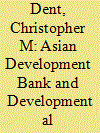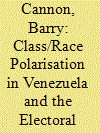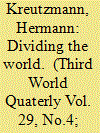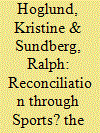|
|
|
Sort Order |
|
|
|
Items / Page
|
|
|
|
|
|
|
| Srl | Item |
| 1 |
ID:
082015


|
|
|
|
|
| Publication |
2008.
|
| Summary/Abstract |
The Asian Development Bank (adb) has made increasingly important contributions to Asia's (and particularly East Asia's) regionalism over recent years, and especially since Haruhiko Kuroda became the Bank's president in February 2005. This paper argues that the adb's role here has become more significant because of the strong 'developmental' characteristics of East Asia's new regionalism. This is not least because, as a regional development bank, the adb has a predilection for linking development, regionalism and capacity-building together when promoting regional co-operation and integration (rci) in Asia. We may refer to this as 'developmental regionalism', where rci activities are particularly orientated to enhancing the economic capacity and prospects of less developed countries with the view of strengthening their integration into the regional economy, and thereby bringing greater coherence to regional community building overall. This analysis is partly based on field research undertaken by the author involving a series of research interviews conducted amongst adb officials and with outside analysts of the organisation. It first examines the evolution of the Bank's stance and policies on rci, and the impact made by President Kuroda and the newly formed Office of Regional Integration (orei) in this regard. The main developments of East Asia's new regionalism are then outlined from finance and trade perspectives. Thereafter, an evaluation is made of the adb's contributions toward the emerging developmental regionalism in East Asia
|
|
|
|
|
|
|
|
|
|
|
|
|
|
|
|
| 2 |
ID:
082012


|
|
|
|
|
| Publication |
2008.
|
| Summary/Abstract |
Bono's launch of Product (red)™ at Davos in 2006 opens a new frontier for development aid. With the engagement of companies such as American Express, Converse, Gap and Emporio Armani, and now Hallmark, Dell and Microsoft, consumers can help hiv/aids patients in Africa. Aid celebrities-Bono, Jeffrey Sachs and Paul Farmer-guarantee the 'cool quotient', the management and the target of this new modality of aid. red functions using the guarantee of celebrity together with the negotiated representation of a distant 'Africa' to meet competing, and perhaps incommensurable, objectives. A 'rock man's burden'-imagined along familiar constructions of sex, gender, race and place-frames African beneficiaries' receiving process. At the same time, red depicts consumer-citizens as fashion-conscious yet actively engaged and ethically reflexive. red rescues international aid from its dour predictive graphs and disappointing 'lessons learnt' and spins it as young, chic and possible. By masking the social and environmental relations of trade and production that underpin poverty, inequality and disease, red reconfigures the world of possibility in what might otherwise be rationally impossible ways.
|
|
|
|
|
|
|
|
|
|
|
|
|
|
|
|
| 3 |
ID:
082013


|
|
|
|
|
| Publication |
2008.
|
| Summary/Abstract |
Polls have repeatedly shown a class-based polarisation around Chavez, which some political science analysis on Venezuela has recognised. This paper seeks to show, however, that this class-based division needs to be placed in historical context to be fully understood. Examining Venezuelan history from the colonial to the contemporary era the paper shows, unlike most previous work on Bolivarian Venezuela, that race is an important subtext to this class-based support, and that there is indeed a correlation between class and race within the Venezuelan context. Furthermore, class and race are important positive elements in Chavez's discourse, in contrast to their negative use in opposition anti-Chavismo discourse. The paper briefly reviews the Chavez government's policy in tackling the class/race fissures in Venezuelan society, and concludes by asking whether these policies represent a change in the historical patterns of classism and racism within Venezuelan society or are simply reproducing past patterns
|
|
|
|
|
|
|
|
|
|
|
|
|
|
|
|
| 4 |
ID:
082010


|
|
|
|
|
| Publication |
2008.
|
| Summary/Abstract |
The central themes in development theory have addressed exclusion of social groups, poverty gaps and strategies to overcome development deficits. In order to perceive the spatial structuring of inequality, concepts defining three separate worlds found ubiquitous appreciation and omnipresent adaptation. Coinciding with the end of the Cold War the 'endism' debate also suggested the end of the 'Third World'. Presently it has become apparent that development theories which have ordered global space into three different worlds are experiencing rejuvenated appreciation. Nevertheless, the recourse towards trichotomising the world is not necessarily stimulated by the same concepts as previously. In the era of globalisation and post-developmentalism concepts favouring nation-states as sole reference points have been challenged and criticised, although the debate about failed states has again drawn attention to those entities. The post-9/11 perception of world order, chaos and conflicts has structured the previously acknowledged limitation of resources and the impossibility of catching-up strategies for developing countries in such a manner that 'new' Third World theories point at the exclusion from the developed world of outsiders, by attributing them pre-modern levels of state development and sovereignty. A prominent result of this debate is a perception of ordered space along lines which seemed to have been abandoned some time ago. This paper compares and scrutinises contemporary concepts of dividing the world
|
|
|
|
|
|
|
|
|
|
|
|
|
|
|
|
| 5 |
ID:
082014


|
|
|
|
|
| Publication |
2008.
|
| Summary/Abstract |
This paper describes and reflects on the author's detention as a prominent Palestinian geographer in an Israeli prison for 23 days by the Israeli Security Police (Shin Bet) in July 2006, and the nightmare of abuse, debasement and physical coercion, amounting to torture, he was subjected to during this ordeal. The author argues that the detention was political, punishment for the way he has 'done the geography of Palestine' and has documented Israeli erasure of the Palestinians from the land. It was centred on extracting imagined 'usable' information from him about his contacts, especially in the field of geography in the Middle East. The paper develops a geographic analysis of the micro-space of detention, and places reflections in a framework that looks at the use of torture as a means to extract 'intelligence', at the current mounting intimidation of academics in the wake of 9/11, and at McCarthyism redux and the '"disciplining" of the disciplines'. It also looks at recent material describing analogous practices by the US army in interrogating detainees at Abu Ghraib prison in Iraq. The paper provides rich empirical first-hand documentation in the form of a thick description of abuse practices suffered by the author inside an Israel prison near Haifa (known as Al Jalama), such as sleep deprivation, environmental manipulation and mortification of the body by handcuffing, chaining and other practices.
|
|
|
|
|
|
|
|
|
|
|
|
|
|
|
|
| 6 |
ID:
082011


|
|
|
|
|
| Publication |
2008.
|
| Summary/Abstract |
Since 2001 (designated as the UN Year of Dialogue Among Civilisations) several initiatives have been developed as a means of resolving problems whose causes have been ascribed, primarily by Samuel Huntington and Bernard Lewis, to civilisational difference. This article questions responses to the 'clash of civilisations' thesis which seem to accept the postulates on which it is based. It suggests that while dialogue is an indispensable tool of social cohesion, the source of many of the problems that pose a continuing threat to regional and global order is not 'civilisational difference' but the failure of governments to comply with international laws and conventions they have sworn to uphold. The explanation that 'civilisational difference' is the root cause of global disorder allows them to sidestep responsibility for the consequences of their own policies. Manipulation of the United Nations at the level of the Security Council is further evidence that the answer to global problems lies in redressing the failings of an entrenched world system that is based far more on power and state perceptions of self-interest than justice. The clearest evidence of structural weakness in the international system is to be found in the Middle East, where the UN Secretary-General's former special representative to the 'peace process', Alvaro de Soto, has drawn attention to the disjunction between public declarations of good intentions and high-level manipulation of this 'process' by powerful actors from behind the scenes. The article concludes that where dialogue is not the problem, it cannot be the solution
|
|
|
|
|
|
|
|
|
|
|
|
|
|
|
|
| 7 |
ID:
082017


|
|
|
|
|
| Publication |
2008.
|
| Summary/Abstract |
Can sports-and if so how-serve as a vehicle for reconciliation and increased social cohesion in countries wrecked by civil conflict? This article analyses the case of South Africa and its experiences in the sports sector since the fall of apartheid, in an effort to explore the processes necessary to understand the potential sports may hold for peace building. By identifying initiatives in South Africa employed at the national, community and individual level of analysis, the article outlines the possible effects of sports on reconciliation in divided states. Through linking experiences from state policies, ngo activities and donor projects with social identity and reconciliation theory, the article outlines the possible positive and negative aspects of sports. Finally, important avenues for further research to uncover how to turn sports into effective political tools for post-conflict peace building are suggested
|
|
|
|
|
|
|
|
|
|
|
|
|
|
|
|
|
|
|
|
|